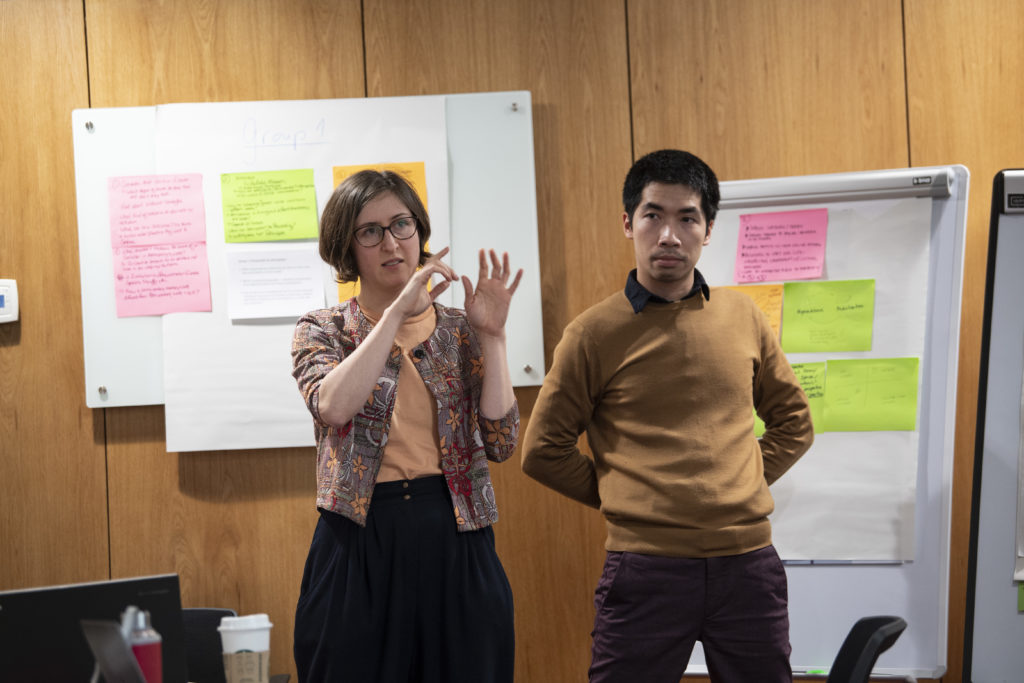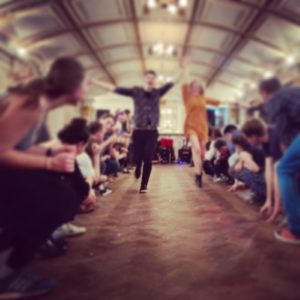By Maria Economou, Franziska Mucha, Cassandra Kist
The University of Glasgow (UGLA) team welcomed the POEM network at Kelvin Hall where the first half of the week was spent in a series of workshops including, Participation by Dr. Elisabeth Tietmeyer, Online Engagement by Dr. Maria Economou and Mediated Memory by Dr. Gertraud Koch. Dr. Tietmeyer, Director of the Museum of European Culture encouraged the network to think about practical examples of how practitioners have recently been facilitating participation in cultural heritage institutions. Through her workshop it became clear that participatory work has shifted into collaborative engagement that is centred on enriching the ways diverse groups of people and institutions work together. This fit perfectly within the context of Kelvin Hall, as it is a unique Glasgow landmark building, which has been transformed by a cultural partnership between Glasgow Life (the City of Glasgow’s Museums and Sport), the Hunterian Museum of the University of Glasgow, and the Moving Image Archive of the National Library of Scotland, which encouraged fellows to think about and discuss how they will work with their participants and research partners. Throughout the week, attendees further contemplated how collaboration and participatory memory work is impacted by and takes place in the context of digital media.
Dr. Maria Economou, University of Glasgow Senior Lecturer in Museum Studies and Digital Curator of the Hunterian Museum questioned, amongst other terms, the notion of community in online engagement and if cultural heritage institutions should focus their energies on supporting ‘networked individuals’ rather than on an idealised notion of communities. Dr Jenny Kidd (Cardiff University) in her guest lecture on Valuing Participatory Memory Practices, also called on attendees to consider if and what forms of participatory practices are valued by institutions and what this signifies about the relationship between museums and participants. Beyond the limitations on participatory memory practices created by cultural heritage institutions and their idealisations, the limitations of digital media ecology in itself, were also central to many discussions.
Prof. Andrew Hoskins (University of Glasgow) in his talk on the ‘Third Way of Memory’ suggested that algorithms influence how we interpret the past, and in turn our present, shaping the future. What does this mean for POEM research? With Dr. Gertraud Koch’s lead, fellows and supervisors compared and contrasted lenses of analysis that might be used to think about participatory memory work as embedded in complex digital media ecologies, accounting for the un-noticed or unseen elements, such as algorithms. These frames included infrastructure studies, assemblage theory and heritagization, and meta-cultural production in European heritage regimes

Returning to a practical perspective, three training sessions prepared the fellows to think about their research in terms of tools for data gathering and analysis but also how their research can contribute to institutions and their publics. Maria Paula Arias and Dr. Chiara Zuanni facilitated a workshop that taught fellows key tools in social media research and analysis, while Adam Koszary, Digital Lead at the Museum of English Rural Life, gave insight into the practical steps, goals and the organisation of social media work in heritage institutions. Daniel Schäefer from ICO Planning Office GbR called on participants to consider how their research could be formulated for a specific audience to improve experiences related to digital media. With his guidance, groups of fellows exercised their creativity and collaborated to create a product based on a user profile, extending theory into practice.
Rachel Thain-Gray from Glasgow Women’s Library pushed thinking about the outcomes of our research further, by asking the fellows to question and reflect on who their research is for and how it can benefit different publics, especially minority groups. Her workshop on in-equality in the museum called all participants to reflect on the POEM network’s values and how as a team, we can pursue our goals in a realistic way that does not artificially represent social-inclusion and diversification of communal European heritage.
During the week, fellows and supervisors hosted a joint-knowledge production session, during which the three work packages (Memory Institutions, People and Groups, and Memory Modalities) split into their respective groups to have an initial discussion on their topics, current state of research and how they can inform or intersect with one-another. At the end, everyone reunited with work package leads describing key take-aways. Importantly, the network connected ideas relating to terms of participation, connectivity and empowerment, and how we can continually discuss these terms with one-another in relation to our projects. Communication and keeping in touch were a central tenant with all work packages deciding to continue discussions on these terms and our projects through a skype seminar over the summer.
The creative and collaborative spirit of the second Knowledge Hub also continued during a series of social events throughout the week. POEM fellows and their supervisors got a chance to explore the Hunterian collections, both on display and behind the scenes in the collection storage held at Kelvin Hall. Conversations continued over a welcome dinner, where POEM fellows and their supervisors competed in a food and memory inspired poetry slam. The week ended with a traditional Scottish twist by dancing at a ceilidh, where the coordination of participants was put to the test.

To find out more about the second POEM Knowledge Hub, visit the POEM website where you can watch the lectures by Jenny Kidd and Andrew Hoskins. Keep in touch with us on Twitter and follow #memoriesconnect and #KH2!


